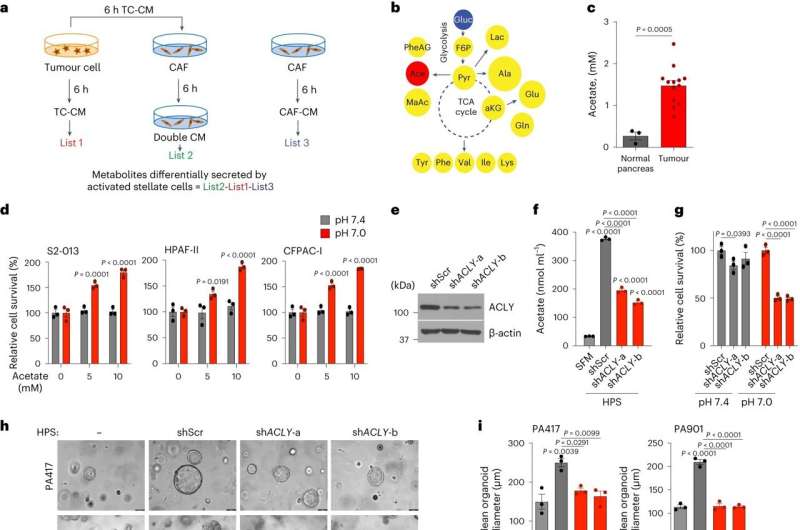This article has been reviewed according to Science X's editorial process and policies. Editors have highlighted the following attributes while ensuring the content's credibility:
fact-checked
peer-reviewed publication
trusted source
proofread
Research details adaptation tactics of pancreatic cancer

Like alien invaders in a sci-fi movie, pancreatic cancer cells quickly adapt to the weapons used against them and find ways to survive, even in the harshest of conditions.
Understanding why is the aim of cancer scientists everywhere. A University of Oklahoma researcher and colleagues now advance the knowledge of pancreatic cancer with a study about how it acclimates to and even thrives in a highly acidic environment. The research is published in the current issue of the journal Nature Cell Biology.
"Very few studies have tried to understand how that acidification contributes to tumor cell viability and what adaptations tumor cells undergo so that they are able to grow and sustain their aggressiveness," said the study's senior author, Pankaj Singh, Ph.D., professor and chair of the Department of Oncology Science in the OU College of Medicine.
Cancer is part of a tumor microenvironment—an ecosystem of normal cells, molecules and blood vessels that surround it, each affecting the other in ways both bad and good. In pancreatic cancer, the microenvironment is acidic because tumor cells consume a lot of the body's glucose and then churn out an overabundance of lactic acid. As a whole, the tumor microenvironment is inhospitable because the cancer has deprived it of oxygen and nutrients due to its out-of-control growth. Yet pancreatic cancer constantly devises new ways to survive.
In his research, Singh discovered a series of steps that occur that allow pancreatic cancer to use the acidic environment to its advantage:
- Cancer-associated fibroblasts, a type of cell in the tumor, secrete a molecule called acetate.
- Pancreatic cancer cells use the acetate for "epigenetic reprogramming," altering the way that genes work.
- One of those genes, called SAT1, is activated by acetate and essentially gives cancer cells the tools they need to better grow in acidic conditions.
Understanding the mechanisms that help tumor cells to adapt and thrive is the foundation for devising treatments that could stop the process somewhere along the way, Singh said. In this case, it may be possible to target SAT1 with a drug that can decrease the fitness of tumor cells to grow in the acidic microenvironment. Singh is continuing his studies by repurposing a pneumonia drug called pentamidine to test its effectiveness in decreasing pancreatic tumor aggressiveness in mice.
Pancreatic cancer remains one of the deadliest cancers—the five-year survival rate is just under 13%, according to the National Cancer Institute—and treatment options are few. Basic science research is crucial for continuing the unravel the devious nature of the cancer.
"This study highlights the fact that pancreatic tumor cells are not acting alone," Singh said. "They have co-culprits in other cells, which they hijack and reprogram to their own advantage. By understanding these mechanisms, we can perhaps come up with better therapeutic approaches to target cancer."
More information: Divya Murthy et al, Cancer-associated fibroblast-derived acetate promotes pancreatic cancer development by altering polyamine metabolism via the ACSS2–SP1–SAT1 axis, Nature Cell Biology (2024). DOI: 10.1038/s41556-024-01372-4



















